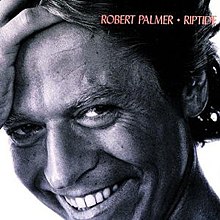| Riptide | ||||
|---|---|---|---|---|
 | ||||
| Studio album by | ||||
| Released | 4 November 1985[1] | |||
| Recorded | July–September 1985 | |||
| Studio | Compass Point (Nassau, Bahamas) | |||
| Genre | Hard rock[2] | |||
| Length | 34:55 | |||
| Label | Island | |||
| Producer | Bernard Edwards | |||
| Robert Palmer chronology | ||||
| ||||
| Singles from Riptide | ||||
| ||||
Riptide is the eighth studio album by English singer Robert Palmer, released in November 4, 1985 by Island Records. The album was recorded over a period of three months in 1985 at Compass Point Studios in Nassau, Bahamas. The album peaked at No. 5 on the UK Albums Chart and at No. 8 on the US Billboard 200. It was certified double Platinum in the US by the RIAA in March 1996 and certified Gold in the UK by BPI in August 1986. It features the songs "Addicted to Love", "I Didn't Mean to Turn You On", "Hyperactive", "Discipline of Love", and "Riptide" which were all released as singles.[4][5] The single "Addicted to Love" was accompanied by an iconic and much-imitated music video, directed by Terence Donovan, in which Palmer is surrounded by a bevy of near-identically clad, heavily made-up female "musicians," either mimicking or mocking the painting style of Patrick Nagel.[6] In September 1986, Palmer performed "Addicted to Love" at the 1986 MTV Video Music Awards in Los Angeles, California.[7] In 1987, he won the Grammy Award for Best Male Rock Vocal Performance for "Addicted to Love". At the 1987 Brit Awards, Palmer received his first nomination for Best British Male.[8]
Another single from Riptide, his cover of R&B singer Cherrelle's "I Didn't Mean to Turn You On", also performed well (US No. 2, UK No. 9).[6] The song, "Trick Bag," was written by one of Palmer's major influences, New Orleans blues artist Earl King.
For the album, Palmer collaborated with two former members of his band the Power Station: guitarist Andy Taylor and drummer Tony Thompson. The Power Station's producer Bernard Edwards also played bass and produced the album. The album also features contributions from Chaka Khan and notable session musicians such as Guy Pratt, Wally Badarou, Jeff Bova, Eddie Martinez, Dony Wynn, and Jack Waldman (who died a year after the album's release).[9]
The title track of the album is a cover of a 1933 song written by Walter Donaldson and Gus Kahn and first recorded by Eddy Duchin and his orchestra.[citation needed][10]
- ^ "Music Week" (PDF). p. 29.
- ^ Ruhlmann, William. "Robert Palmer - Heavy Nova Album Reviews, Songs & More | AllMusic". allmusic. Retrieved 26 March 2023.
- ^ "Music Week" (PDF). p. 8.
- ^ Whitburn, Joel (2006). The Billboard Book of Top 40 Hits. Billboard Books
- ^ Roberts, David (2006). British Hit Singles & Albums. London: Guinness World Records Limited
- ^ a b Strong, Martin C. (2014). The Great Rock Discography (5th ed.). Mojo Books. pp. 2–3. ISBN 978-1-84195-017-4.
- ^ 1986 MTV Video Music Awards MTV.com. Retrieved 5 December 2011
- ^ BRITs Profile: Robert Palmer Archived 23 June 2014 at the Wayback Machine. Brits.co.uk. Retrieved 14 April 2012
- ^ "The Estate Project". 1 October 2006. Archived from the original on 1 October 2006. Retrieved 17 July 2018.
- ^ "1934 Eddy Duchin - Riptide (Lew Sherwood & The De Marco Sisters, vocal)". YouTube. Retrieved 11 February 2022.